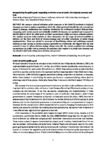Renegotiating the public good: Responding to the first wave of COVID-19 in England, Germany and Italy
| dc.contributor.author | Kelly, Peter | |
| dc.contributor.author | Hofbauer, S | |
| dc.contributor.author | Gross, B | |
| dc.date.accessioned | 2021-08-23T06:57:53Z | |
| dc.date.available | 2021-08-23T06:57:53Z | |
| dc.date.issued | 2021-09 | |
| dc.identifier.issn | 1474-9041 | |
| dc.identifier.issn | 1474-9041 | |
| dc.identifier.other | ARTN 14749041211030065 | |
| dc.identifier.uri | http://hdl.handle.net/10026.1/17727 | |
| dc.description.abstract |
We compare national education policy responses to the COVID-19 pandemic in England, Germany and Italy to explore negotiations about the public good and identify the role that research has played in framing, legitimating and rendering trustworthy the settlements reached. National data, comprising news media reports and publically available documents, are analysed and compared to identify debates about the public good and their consequences within and across national contexts. Our analysis contrasts policy contexts on three dimensions: (a) the range of interests included in debates; (b) the form and locus of decision-making; and (c) public acceptance of policy during implementation. These are related to processes of depoliticising debate and politicising research evidence in each context, as factions position themselves as trustworthy. We suggest that the way research is seen to inform decision-making during crises such as the current COVID-19 pandemic has enduring consequences for public trust in research, the politicians who employ it to justify their decisions and the schools tasked with putting these decisions into practice. | |
| dc.format.extent | 584-609 | |
| dc.language | en | |
| dc.language.iso | en | |
| dc.publisher | SAGE Publications | |
| dc.subject | Education policy | |
| dc.subject | policy negotiation | |
| dc.subject | research-informed policy-making | |
| dc.subject | the public good | |
| dc.title | Renegotiating the public good: Responding to the first wave of COVID-19 in England, Germany and Italy | |
| dc.type | journal-article | |
| dc.type | Journal Article | |
| plymouth.author-url | https://www.webofscience.com/api/gateway?GWVersion=2&SrcApp=PARTNER_APP&SrcAuth=LinksAMR&KeyUT=WOS:000672938800001&DestLinkType=FullRecord&DestApp=ALL_WOS&UsrCustomerID=11bb513d99f797142bcfeffcc58ea008 | |
| plymouth.issue | 5 | |
| plymouth.volume | 20 | |
| plymouth.publication-status | Published | |
| plymouth.journal | European Educational Research Journal | |
| dc.identifier.doi | 10.1177/14749041211030065 | |
| plymouth.organisational-group | /Plymouth | |
| plymouth.organisational-group | /Plymouth/Faculty of Arts, Humanities and Business | |
| plymouth.organisational-group | /Plymouth/REF 2021 Researchers by UoA | |
| plymouth.organisational-group | /Plymouth/REF 2021 Researchers by UoA/UoA23 Education | |
| plymouth.organisational-group | /Plymouth/Research Groups | |
| plymouth.organisational-group | /Plymouth/Research Groups/Institute of Health and Community | |
| plymouth.organisational-group | /Plymouth/Users by role | |
| plymouth.organisational-group | /Plymouth/Users by role/Academics | |
| dcterms.dateAccepted | 2021-06-15 | |
| dc.rights.embargodate | 2021-10-9 | |
| dc.identifier.eissn | 1474-9041 | |
| dc.rights.embargoperiod | Not known | |
| rioxxterms.versionofrecord | 10.1177/14749041211030065 | |
| rioxxterms.licenseref.uri | http://www.rioxx.net/licenses/all-rights-reserved | |
| rioxxterms.licenseref.startdate | 2021-09 | |
| rioxxterms.type | Journal Article/Review |


